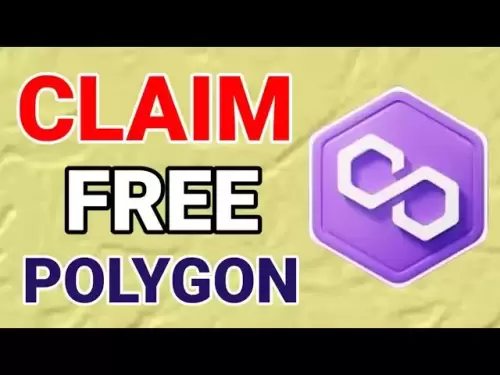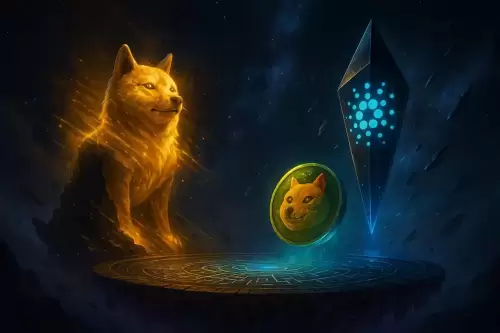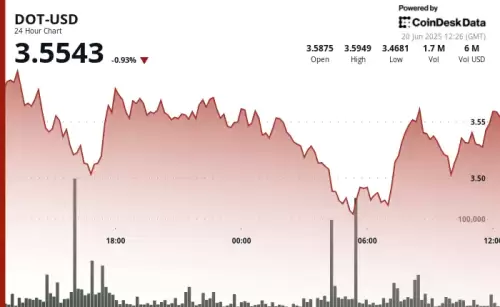 |
|
 |
|
 |
|
 |
|
 |
|
 |
|
 |
|
 |
|
 |
|
 |
|
 |
|
 |
|
 |
|
 |
|
 |
|
Web3的零散景观是UX的噩梦。但是,跨链技术的创新为用户友好的未来铺平了道路。让我们潜入!

Web3 promised a decentralized utopia, but delivered a fragmented mess. Cross-chain interoperability isn't just a tech upgrade; it's the foundation for Web3's mainstream future.
Web3答应了一个分散的乌托邦,但散布了一团糟。跨链互操作性不仅仅是技术升级;这是Web3主流未来的基础。
The Web3 Fragmentation Fiasco
Web3碎片惨败
Right now, Web3 feels like navigating a maze. You need a different wallet for every chain, each with its own rules and tokens. Imagine holding Bitcoin in a hardware wallet, trading Ethereum tokens on MetaMask, and staking Cardano via Lace Wallet. Each step requires manual bridging, fee calculations, and constant security checks. It’s not just inconvenient; it's a systemic failure.
目前,Web3感觉就像在迷宫一样。您需要为每个链条,每个链条,都有自己的规则和令牌。想象一下,在硬件钱包中握住比特币,在metamask上交易以太坊代币,并通过蕾丝钱包堆放卡丹诺。每个步骤都需要手动桥接,费用计算和持续的安全检查。这不仅是不便的;这是系统的失败。
Even addresses are a headache! Ethereum uses hexadecimal, Bitcoin uses Base58, and newer chains invent their own. Galaxy researchers call this "asset fragmentation," where tokens bridged across chains become non-fungible and confusing. It's like the Tower of Babel, where chains can barely talk to each other.
甚至地址都是头痛!以太坊使用十六进制,比特币使用base58,而较新的链发明了自己的链条。银河研究人员称这种“资产碎片化”,在跨链条上桥接的令牌变得不可杀死和令人困惑。就像巴别塔一样,连锁店几乎无法互相交谈。
Transaction Fees: The Silent UX Killer
交易费:沉默的UX杀手
Cross-chain transactions come with a hidden tax: fees. You pay on the source chain, the destination chain, and for relay services. If you're not careful, fees can eat up the value of your transfer. ERC-20 swaps on Ethereum can hit $10 during peak times, and even layer-2 bridging adds complexity.
跨链交易带有隐藏的税收:费用。您可以在源链,目的地链和中继服务上付款。如果您不小心,费用可能会吞噬转移的价值。 ERC-20在以太坊上的掉期在高峰时段可能达到10美元,甚至第2层桥接也会增加复杂性。
Solutions like Arbitrum and Optimism offer some relief, cutting fees by up to 95%. But Solana's co-founder points out that they also add fragmentation. Bridging USDC from Arbitrum to Polygon still means dealing with different architectures and completion times. True interoperability needs to abstract these complexities, not just optimize them.
仲裁和乐观等解决方案提供了一些缓解,将费用削减多达95%。但是Solana的联合创始人指出,它们也增加了分裂。将USDC从仲裁到多边形仍然意味着处理不同的架构和完成时间。真正的互操作性需要抽象这些复杂性,而不仅仅是优化它们。
Towards a Chain-Agnostic Nirvana
朝向链条涅rv的涅rv
The real goal isn't just cross-chain transactions, but chain-agnostic ones. Users should access DeFi pools, NFT markets, and DAOs through unified interfaces. Imagine a wallet that picks the cheapest chain for swaps, routes transactions over optimal bridges, and consolidates fees into one stablecoin payment, all while keeping your assets secure.
真正的目标不仅仅是跨链交易,还包括链条不合时宜的交易。用户应通过统一界面访问Defi池,NFT市场和DAO。想象一下,一个钱包可以选择最便宜的链条进行交易,交易与最佳桥梁相比,并将费用整合到一笔稳定的付款中,同时确保您的资产安全。
This requires innovations like DeFAI. If interchain transactions were seamless, AI agents could handle most DeFi transactions. We're not there yet, but it's the vision.
这需要像Defai这样的创新。如果链交易是无缝的,则AI代理可以处理大多数Fefi交易。我们还没有到达,但这是愿景。
Smart contracts should run cross-chain without wrappers, and decentralized identities should move frictionlessly between ecosystems. We need super wallets that unlock the full potential of Web3.
智能合约应在没有包装纸的情况下运行跨链,而分散的身份应在生态系统之间无摩擦。我们需要超级钱包来解锁Web3的全部潜力。
Security: The Non-Negotiable Pillar
安全:不可谈判的支柱
Interoperability can't come at the cost of security. Cross-chain bridges are prime targets, with over $2 billion stolen in 2023 alone. Centralized validators and opaque code are a no-go. New cryptographic tools, like zero-knowledge proofs, can verify cross-chain events without trusted middlemen.
互操作性不能以安全为代价。跨链桥是主要目标,仅2023年就被盗了20亿美元。集中式验证器和不透明的代码是不做的。新的加密工具,例如零知识证明,可以在没有信任的中间人的情况下验证跨链事件。
The industry needs high security standards. We need collaborative initiatives, like the Linux Foundation’s Decentralized Trust, to create those standards. Developers must prioritize interoperability in base protocols, not as an afterthought. Users need to demand it from wallet and dApp providers.
该行业需要高安全标准。我们需要像Linux Foundation的分散信任等协作计划来创建这些标准。开发人员必须优先考虑基本协议中的互操作性,而不是事后想法。用户需要从Wallet和Dapp提供商那里要求它。
Polkadot: A Layer 0 Solution
Polkadot:0层解决方案
Polkadot, launched in May 2020, is a layer 0 blockchain aiming to create an "internet of blockchains." It uses a multi-chain architecture with specialized blockchains called parachains that function in parallel while benefiting from the shared security of the Relay Chain.
Polkadot于2020年5月推出,是0层区块链,旨在创建“区块链互联网”。它使用的多链体系结构具有专门的区块链,称为Parachains,在中继链的共同安全性中受益,该链链并行起作用。
The DOT token is central to Polkadot, used for governance, staking, bonding, and transaction fees. This design allows blockchains to specialize while staying connected, overcoming scalability and interoperability limitations.
点令牌是Polkadot的核心,用于治理,积分,结合和交易费用。该设计使区块链在保持连接时可以专业化,克服可伸缩性和互操作性限制。
The Bottom Line
底线
Blockchains need interconnection. Just like TCP/IP unified computer networks, interoperability protocols can weave isolated Web3 chains into a cohesive digital economy. The blueprints exist; what we need now is collective will.
区块链需要互连。就像TCP/IP统一的计算机网络一样,互操作性协议可以将隔离的Web3链编织到凝聚力的数字经济中。存在蓝图;我们现在需要的是集体意志。
We need to stop building isolated kingdoms and start laying the railroads between them. Only then will Web3 become user-friendly and fulfill its promise. Interoperate or stagnate, folks!
我们需要停止建立孤立的王国,并开始在它们之间铺设铁路。只有这样,Web3才会变得易于使用并实现其诺言。伙计们,互操作或停滞不前!
免责声明:info@kdj.com
所提供的信息并非交易建议。根据本文提供的信息进行的任何投资,kdj.com不承担任何责任。加密货币具有高波动性,强烈建议您深入研究后,谨慎投资!
如您认为本网站上使用的内容侵犯了您的版权,请立即联系我们(info@kdj.com),我们将及时删除。
-

- Pepe Coin的疯狂旅程:市场下降还是购买机会?
- 2025-06-21 00:25:13
- 随着价格下降,佩佩硬币面临着关键的时刻。是时候购买蘸酱了,还是不可避免的市场下跌?让我们深入研究分析。
-

-

-

- 金币,稀有,马:钱币综述
- 2025-06-20 22:45:13
- 从查尔斯二世几内亚到凯斯花园50ps,发掘了稀有的金币,以及他们讲的有趣的故事。另外,津巴布韦的黄金硬币计划停止。
-

-

-

-

- Polkadot的点:导航三重底部和看涨逆转
- 2025-06-20 23:25:12
- Polkadot的点显示了弹性,在击中潜在的三重底部后形成了看涨的逆转模式。这是大规模集会的开始吗?
-































































